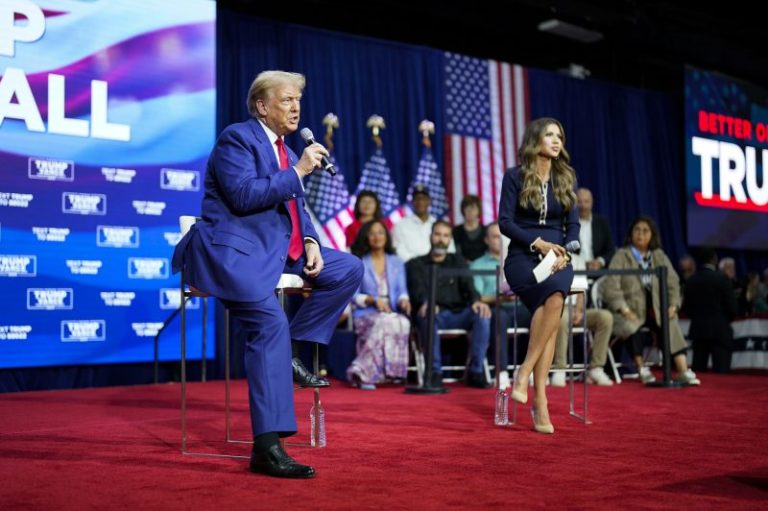Donald Trump’s town-hall-style campaign event in Pennsylvania on Monday understandably attracted more attention for its conclusion than for its contents. But the actual question-and-answer period did provide useful insights that should not be overlooked.
One of the questions posed to Trump — apparently prescreened by the campaign — came from a Black woman standing behind him on the stage. Reading from a card, the woman said she had been raised in a Democratic, union household in Philadelphia before (as other question-askers said as well) seeing the light about America’s problems — and, in particular, how they affect the Black community.
“Like my fellow Americans,” the woman said, “my grocery bill has not gone down. Everything is still so very expensive. What steps will your administration take to help American families suffering from this inflation?”
What follows is Trump’s response in its entirety. Some audience feedback is indicated, and we’ve added some footnotes for clarification and correction. Paragraph breaks are placed approximately where Trump appeared to shift his train of thought.
Trump’s answer
“So, you know, it’s such a great question in the sense that people don’t think of grocery. You know, it sounds like not such an important word when you talk about homes and everything else, right? But more people tell me about grocery bills, where the price of bacon, the price of lettuce, the price of tomatoes, they tell me. [1] And we’re going to do a lot of things.
“You know, our farmers aren’t being treated properly. And we had a deal with China, and it was a great deal — I never mentioned it because once covid came in, I said, that was a bridge too far because I had a great relationship with President Xi [Jinping]. And he’s a fierce man and he’s a man that likes China and I understand that. But we had a deal and he was perfect on that deal, $50 billion he was going to buy. [2] We were doing numbers like you wouldn’t believe, for the farmer. But the farmers are very badly hurt. The farmers in this country, we’re going to get them straightened out. We’re going to get your prices down.
“But you asked another question about safety and also about Black population jobs and Hispanic population in particular those two. [3] So when millions of people pour into our country, they’re having a devastating effect on Black families and Hispanic families more than any others. [4] I think it’s going to spread to a lot of other places.
“I think it’s going to spread to unions. I think unions are going to have a big problem because, you know, employers are just not going to pay the price. They’re going to — and it’s going to be — it’s a very bad thing that’s happening.
“So they’re coming in. Many are coming in from jails and prisons and mental institutions, insane asylums. [5] That’s like, you know, step above, right? Insane asylum. And whenever I go, Hannibal Lecter, you know what I’m talking about. They always go — the fake news. That’s a lot of fake news back there, too.”
[Boos from the audience.]
“They always mention — you know, it’s a way of demeaning, they say, ‘Hannibal Lecter, why would he mention?’ [6] Well, you know why, because he was a sick puppy, and we have sick puppies coming into our country. I figured that’s a lot — that’s better than wasting a lot of words. You just say, ‘Hannibal Lecter. We don’t want him.’ But. But they always sort of say, ‘Why would he say that?’ I do it for a lot of reasons.
“But I do it because we are allowing some very bad people into our country. And they’re coming as terrorists. You know, you saw the other day, last month they had the record number of terrorists. [7] I had a month — and I love Border Patrol.
“Did you see they gave me a full endorsement two days ago? Border Patrol.” [8]
[Cheers from the audience.]
“The Border Patrol. And they’re great. And, you know, they want to do their job. They don’t want to let these people come in. They look at them. They can tell. They can look at somebody, say good, bad. They say what’s coming into our country now, it’s having a huge negative impact on Black families and on Hispanic families and ultimately on everybody.
“And we’re going to close that border so tight. It’s going to be closed. And I said the two things I’m going to do, first, we’re going to close that border — [9] and people are going to come in. You want people to come in. We need people to come in. People are going to come into our country legally.
“You know, it’s so unfair. You have people that are waiting on a system, in a line and they’ve been waiting in this line. You know how long? For years, 10 years, 12 years and they study and they take tests. And then people come. I actually say, ‘Why don’t you just go and just come on across?’ I tell people that it’s terrible, right? I said, ‘Go out. You’re incredible.’ They say, ‘What can I do to speed up the process?’ I say, ‘You know what, go to the southern border. I’ll see you on the other side.’ It’s so unfair. [10]
“But we’re going to have them come in legally. You have to see what they have to do. They take tests on, you know, who was the first one here? What date was this? What does 1776 mean? All this stuff.
“And these other people are coming in and they’re affecting the school systems and they’re affecting the hospital system. I mean, if you take a look at what’s going on in Springfield, Ohio, a town of 50,000 people, they’ve just added 32,000 people. Illegal immigrants. [11] And we’re not going to put up with it.
“And we’re going to take care of your costs are going to come down, and you’re not going to have a problem with — because the biggest problem, and I’m hearing it from Black people and to a lesser extent right now, but it’ll be the same, Hispanic people.
“And I’ll tell you what, our poll numbers have gone through the roof. With Black and Hispanic, have gone through the roof. [12] And I like that. I like that. I like that. So we’re going to take care of it. You will be — I’ll tell you, if everything works out, if everybody gets out and votes on January 5th. [13] Or before.
“You know, it used to be, you’d have a date. Today, you can vote two months before, probably three months after. They don’t know what the hell they’re doing. But we’re going to straighten it all out. We’re going to straighten that out. We’re going to straighten our election process out, too. That’s going to be important, also. So thank you very much, darling. We’re going to get it straight. Thank you.”
And that is how Trump will address inflation.
Footnotes
[1] The Wall Street Journal recently conducted a survey of economists. Overwhelmingly, they indicated that Trump’s stated economic policies — heavy on tariffs that would raise the cost of goods for Americans — would be inflationary.
[2] Trump’s former national security adviser John Bolton claimed that Trump had pushed the Chinese president to buy goods from American farmers specifically to boost his reelection bid. In part thanks to the pandemic, the purchases stipulated in the deal were not made.
[3] She did not ask this question.
[4] Black and Hispanic unemployment hit record lows during the Biden administration.
[5] These comments about prisons and insane asylums are years-old rhetoric from Trump that is not substantiated.
[6] Here’s the answer to the very good question of why Trump keeps talking about 1990s movie character Hannibal Lecter.
[7] Like many on the right, Trump opportunistically conflates being on the Terrorist Screening Dataset with being a terrorist. While apprehensions of people on that watch list between border checkpoints are up, more people on the watch list were stopped at the southwest border in 2019, under Trump, than at any point in Joe Biden’s presidency.
[8] The union of Border Patrol agents endorsed Trump, not the government agency.
[9] Trump was probably going to refer to his “dictator on day one” pledge of addressing the border and drilling for oil, if he hadn’t gotten sidetracked.
[10] This comment about going to the southern border is not good advice, unless the people Trump knows have viable reasons to seek asylum in the United States.
[11] The number of immigrants from Haiti presented by Trump is exaggerated. More important, they are in the country legally.
[12] Trump’s poll numbers with Black and Hispanic voters are better than the support he saw in 2020, but he is still losing with both groups.
[13] Election Day is Nov. 5.



